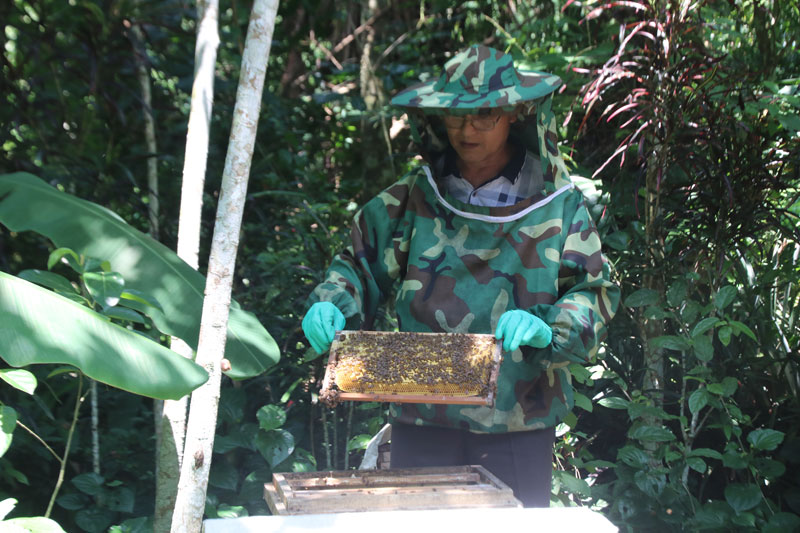
(HBO) – Boasting rich ecosystem, favourable climate and vast area of forest land, Doc Lap commune in Ky Son district holds huge potential for honey production. In fact, beekeeping has improved income and living quality of local people, helping promote the commune’s socio-economic development.

A beekeeping model developed by Nguyen Ngoc
Thich in Noi hamlet, Ky Son district’s Doc Lap commune earns his family some
300 million VND each year.
Seeing the economic efficiency of beekeeping, five
households have developed more than 300 bee colonies in Song and Noi hamlets, which
boast good climate and abundant food supply. As compared to other economic
model, beekeeping requires less manpower and lower investment while running
lower risks and having stable income.
In a bid to support the households in expanding beekeeping business, the
commune has created conditions for them to get access to preferential loans
from the district’s Bank for Social Policies. Besides, local beekeepers are
encouraged to share experience and help each other, thus branching out
effective models.
However, honey production in the commune is now at small scale, and most of the
products are sold to local residents. Besides, science and technology have not
been applied comprehensively in production to maximise yield and quality.
Chairman of the communal People’s Committee Nguyen Ngoc Que said "Doc Lap is
among the communes in Ky Son district benefiting from the Programme 135 under
the National Target Programme on Sustainable Poverty Reduction. Last year, the
commune’s income per capita stood at 19.6 million VND, and its poverty rate was
35.9 percent. The locality sees beekeeping as an effective model to reduce poverty
sustainably. In the coming time, it will continue encouraging local residents
to expand their beekeeping scale and increase bee colonies.”
He hopes competent sectors and agencies will organise training courses, provide
financial assistance, transfer science-technology to local residents, and
expand consumption market for local honey./.
According to data from the Hoa Binh Provincial Party Committee, the industrial production index for the first six months of 2025 is estimated to have increased by 20% compared to the same period last year. This marks the highest year-on-year growth rate for this period since 2020.
In the first six months of 2025, Hoa Binh province’s export turnover was estimated at 1.145 billion USD, marking an 18.11% increase compared to the same period in 2024. Import turnover was estimated at $ 804 million, a 17.15% increase, which helped the province maintain a positive trade balance.
The lives of the ethnic minority farmers in Tan Lac district have gradually improved thanks to the new directions in agricultural production. This is a testament to the collective strength fostered through the professional associations and groups implemented by various levels of the district’s Farmers’ Union.
With the motto the "product quality comes first,” after nearly one year of establishment and operation, Muong village’s Clean Food Agricultural and Commercial Cooperative, located in Cau Hamlet, Hung Son Commune (Kim Boi district), has launched reputable, high-quality agricultural products to the market that are well-received by consumers. The products such as Muong village’s pork sausage, salt-cured chicken, and salt-cured pork hocks have gradually carved out a place in the market and they are on the path to obtaining the OCOP certification.
In the past, the phrase "bumper harvest, rock-bottom prices" was a familiar refrain for Vietnamese farmers engaged in fragmented, small-scale agriculture. But today, a new spirit is emerging across rural areas of Hoa Binh province - one of collaboration, organisation, and collective economic models that provide a stable foundation for production.
Maintaining growing area codes and packing facility codes in accordance with regulations is a mandatory requirement for agricultural products to be eligible for export. Recently, the Department of Agriculture and Environment of Hoa Binh province has intensified technical supervision of designated farming areas and packing facilities to safeguard the "green passport" that enables its products to access international markets.



